#it's normal. but to write off the whole category and say they're all the same bad cringe shit... idk
Explore tagged Tumblr posts
Text
it's fine to dislike things but man. the genuine vitriol that x reader fics get from people is so weird to me. redirect that energy to something worthwhile I beg lmao
#idk lol like ok I get it. even I have personal tastes/likes and dislikes WITHIN x reader fic right?#I can understand and appreciate genuine criticsm and discussion about it!!! like rep for black readers or fat readers or male readers !!!#it's normal. but to write off the whole category and say they're all the same bad cringe shit... idk#it's fine to dislike it I think I just take issue with how they treat the writers#but no point reasoning with a brick wall#this is not opening debate btw I'm just venting#priv
56 notes
·
View notes
Text
Eisteddfod Chairs: Pick Your Winner!
It's almost June! Nearly time to reveal the 2023 Chair! So come, gather round Tumblrs, let me tell you of the furniture-based customs of my people
So Wales has been celebrating Eisteddfodau (festivals of poetry, music, and disco dancing), in some form or another, since at least the 1100s, when Lord Rhys of Dinefwr had one all formal-like and made it into a big fun party and that. The word basically means 'sitting place', and probably refers to the way people in summer would gather round the twmpath in the village to listen to bards that passed through and drink mead and shout 'hurrah!' a lot. Amazingly, this is not where the Chair Thing comes from.
Part of Welsh history is the Bardic Age, and it was custom for bards to travel the country and visit the courts of assorted gentry types (also normal people's houses and taverns and twmpaths but let's stay on topic) and play for them. If the lord paid well, great; if not, the bard would write a Super Mean Song about them and sing it everywhere, so they were pretty well treated.
But if they were particularly good, rather than making them play for the WHOLE meal, the lord would offer them a chair at the table to join in the feast as a guest, rather than a worker, and THAT is where the Chair Thing comes from.
Anyway that's preamble to say that every year in the biggest Eisteddfod of all - the Eisteddfod Genedlaethol - the highest honour awarded goes to the Prifardd - the bard who writes the winning cywydd (super complex Welsh poetry WE DON'T HAVE TIME TO EXPLAIN ALL OF THIS). And the prize for writing the winning cywydd is that you are awarded, you guessed it, the Chair.
Now these Chairs (capital C, please, we like a bit of Fantasy Novel Capitalisation and for this cultural reason I will never understand people who complain about it) are unique. They are thrones. They are carved each year by one chosen carpenter, who crafts a one-of-a-kind Chair with symbolism and that, never to be replicated. They usually have the year carved on, but otherwise, they vary wildly in aesthetic and symbolism. In a No Award year (because Eisteddfod judges don't subscribe to the Western idea that there HAS to be a first, second and third place; if no one is good enough there is no award, and I have seen choir competitions for seven year olds where there was no first or third place but there were two choirs in joint second), the Chair is sent back to the carpenter who carved it, and they get to keep it. In a year where the bard died before the ceremony, it is draped in black, and given to next of kin.
(That has only happened once. RIP Hedd Wyn, 1887-1917. Also the only reproduced Chair; the original, known as the Gadair Ddu (the Black Chair) is on display in his family home, but a 3D printed replica has been made for display by Amgueddfa Cymru)
BUT THEREFORE a big part of Eisteddfod fun is seeing what the Chair will look like this year. Traditional ones, see, we tend to think look like variants of this:

(Apologies for the substandard attempts at alt-text; I have no clue how to describe these properly)
This one is from 1896. The phrase "Y gwir yn erbyn y byd" means "The truth against the world", and was included in a lot of old ones. Modern ones tend to incorporate the druidic symbol for awen ("poetic inspriation") instead. Some of these incidentally turn up in lil' chapels and that about the country.
But actually even the old ones were mad different, look; clockwise from top left, these are y Gadair Ddu (1917), 1876, 1926 (when the carpenter was Chinese and enjoyed the cultural fusion), and 1908.




Still the same theme, though, but in the modern day the carpenters are all off the shits! They're all over the place! Fuck the rules! And I have Opinions.
Category: I See What You Did There
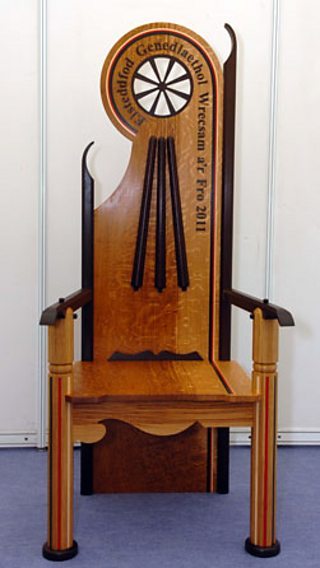
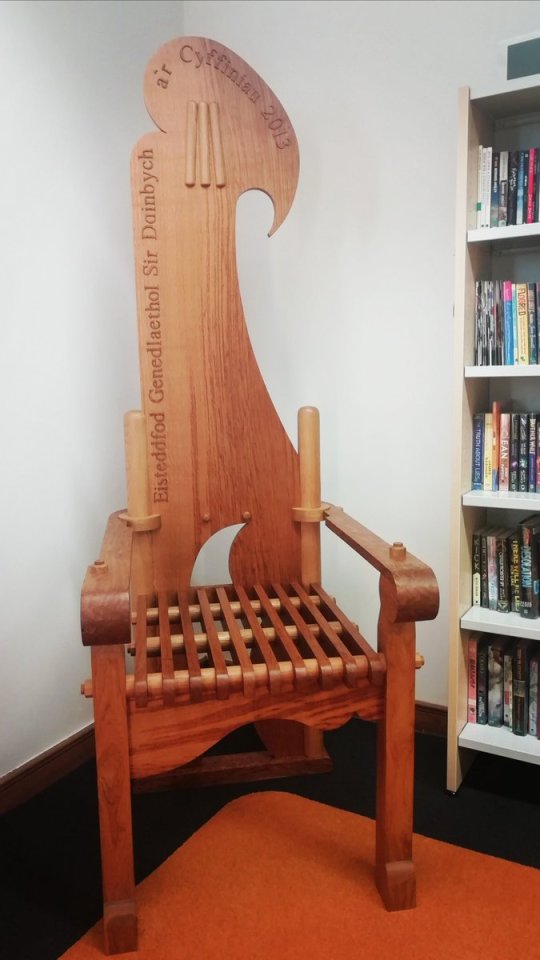
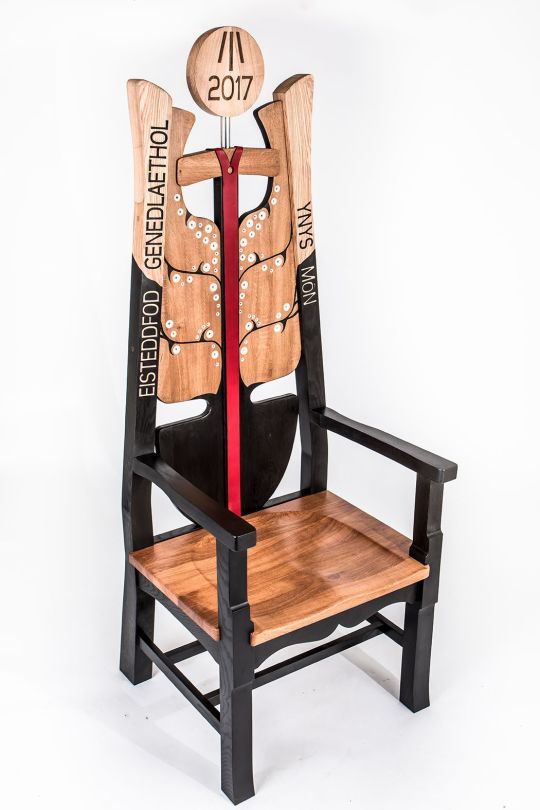
SYMBOLISM!!! 2011 is a pit wheel from Wrexham's mining past! 2013 is the head of a harp, from Denbighshire's cultural harp-making past! 2017 is fish, from Anglesey's maritime present! Fantastic. Love it.
Best in category: 2017. Why does Anglesey's have so many eyes on the fish? We don't know. Wylfa B protestors reportedly furious.
Category: The Modern Throne
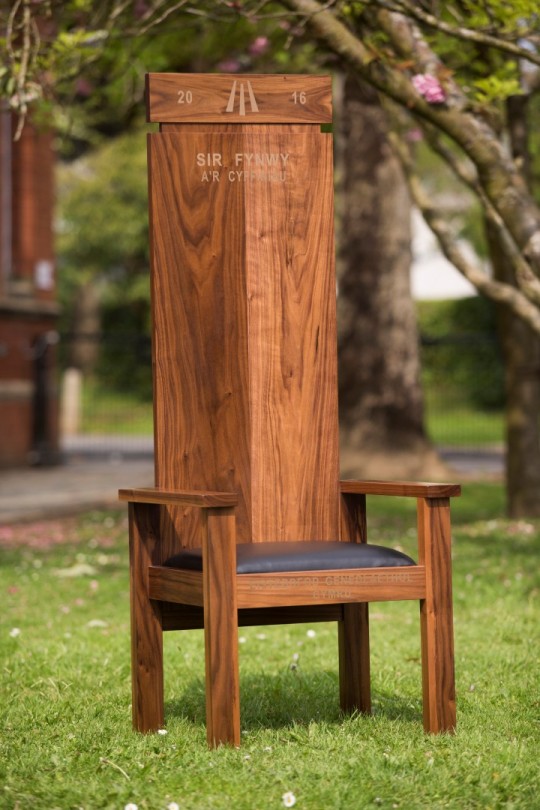
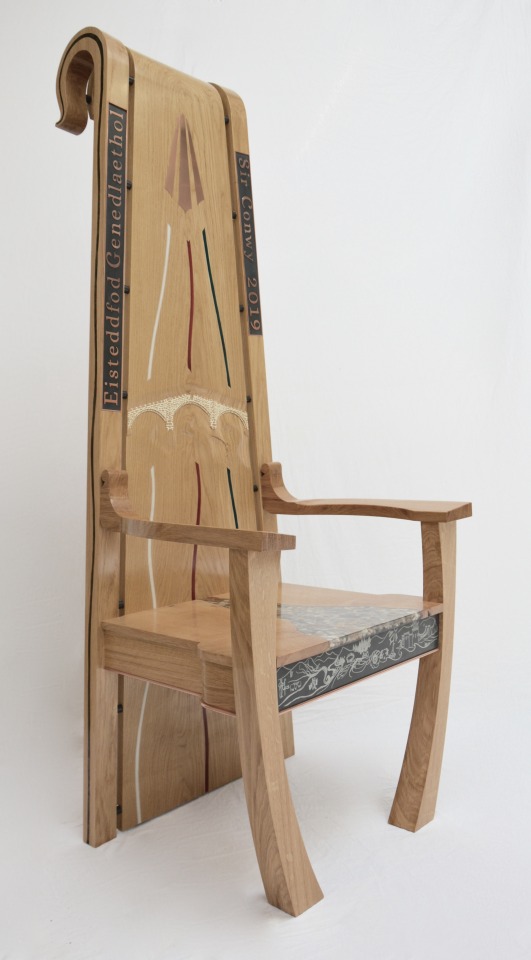
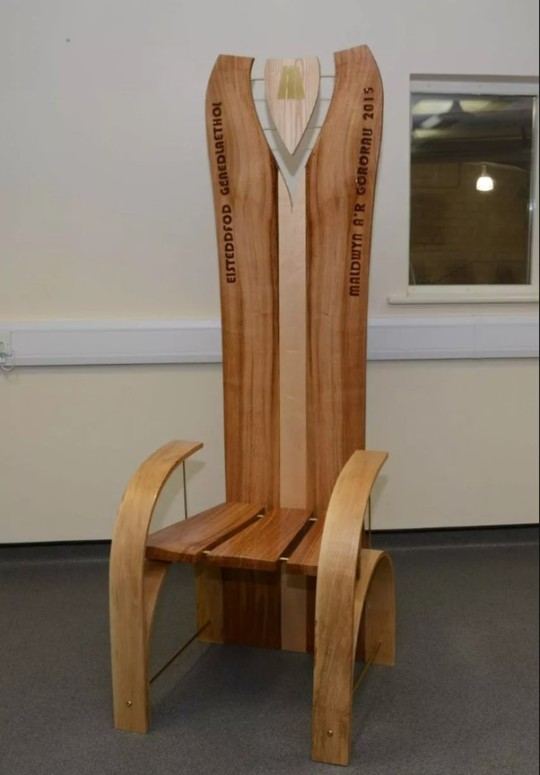
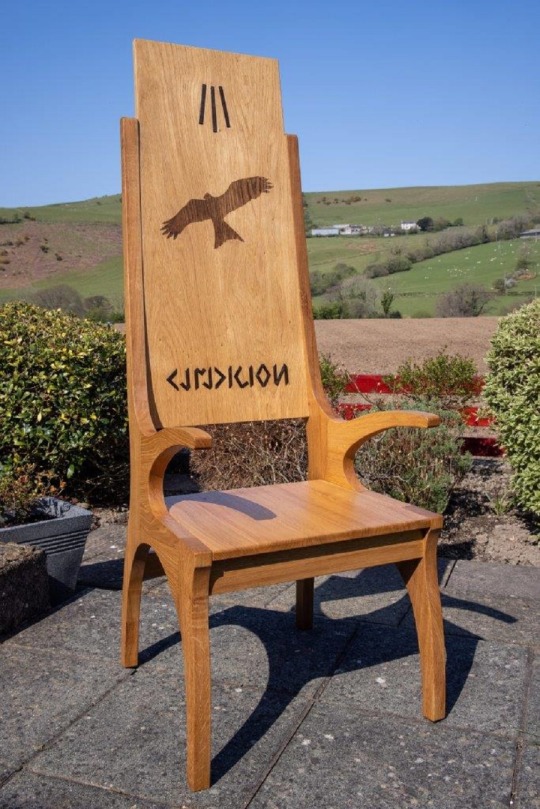
TALL!!! That silhouette! That height!! They have the range, darling! Christ knows 2016 doesn't have anything else going for it! Shout out to the Conwy river on 2019, the different woods from the forests of Maldwyn for 2015, and the red kite symbolism for Ceredigion in 2022 (the spiritual home of the bird, where the species was first saved).
Best in category: 2019, Conwy. I like the bridge and the river lines and the water effect on the front of the seat it's just so pretty.
Category: That's Just A Chair



(I am actually friends with the Prifardd who won 2018 at the bottom there :D )
WHAT ARE RULES WE JUST WANT FUNCTIONAL CHAIRS. Man even so 2014 was fucking ugly. You could have 2018 in your house. Around your table, like. Even 2012 has a sort of IKEA vibe that's boring but palatable. 2014 is only coming in the house under sufferance.
Best in Category: 2018, easy, and not just because it's the one I'm most likely to get to sit in one day. It's pretty.
Category: NO GODS NO CHAIRS NO MASTERS


WHAT
WHAT THE FUCK HAPPENED IN 2010
BRO I DO NOT THINK YOU TRIED
Best in Category: OBVIOUSLY 2021 I COULD PHYSICALLY MAKE 2010 MYSELF
1K notes
·
View notes
Text
Doctor Whoquest Part Two: Capaldi, Season 1

The next installment of my ongoing Doctor Whoquest returns, this time with the debut season of Peter Capaldi in the role. I will be honest: I feel like I missed out on just how excellent Capaldi is. It doesn't come up until his next season, but this entire episode, and especially this sequence might be my favorite in all of Nu-Who and I don't know if any Doctor other than Capaldi could have pulled it off.
(Thinking about 'Heaven Sent', I'd put it up there with some of the greatest science fiction ever seen on television, if not just a great television moment, full stop-- but I'm getting ahead of myself here.)
I loved Capaldi's debut episode. I think a lot of Doctor debuts that don't start fresh out the gate with new companions have that whole 'but are they still MY Doctor' thing hanging over them and I don't think that was the primary focus of 'Deep Breath'- instead, it was about the Doctor figuring out if he was still the Doctor and kind of finding himself in a way you don't normally see. It tracks perfectly with the series however: this is post-Trenzalore, he's got a fresh set of regenerations, courtesy of the Time Lords and it really is uncharted territory- a fact underlined by the phone call Clara receives at the end of the episode from Matt Smith's Doctor, who advises her that this Doctor is going to be pretty lost and looking to figure out who he is.
Also: when are we getting a spin-off with the Paternoster Gang? I know Russell T. Davis is back in charge and he's all about Torchwood but... come on now. They're sitting right there and they're awesome characters. I want to know more!
I think I'm going to have to make peace with Doctor Who's insistence on scattering clues to a big bad season finale throughout any given season. It annoys me because it feels so familiar and doesn't actually end up being all that much of a surprise in the end. (Who is the mysterious woman? Is she up to nefarious deeds? Will we find out conveniently at the end of the season? I think we will!) If there is one thing I would like Nu-Who to do, it's to move away from that or at least be a hell of a lot more subtle about it so there's some actual suspense about it. (I'd also like to add to the list: Daleks and Cybermen. Do something original with them or don't use them at all! We get it: the Doctor hates the Daleks-- I don't know how many variations on that theme I've seen, but it's getting tiresome. If you've been around for six decades, I feel like you can resurrect some old-school villains and people will understand.)
Every Doctor puts their own spin on the character and while 13's was not as twitchy and suave as say, 11's, Capaldi (!2) manages to be eccentric, foreboding, and feels like an alien more than any of the other Doctors in Nu-Who put together. I know everyone has their favorite Doctor-- but I feel like I underrated Capaldi in this role and I can't wait to watch more of him.
Three Episodes I Liked:
'Listen': I understand if you have mixed feelings about the Danny Pink of it all goodness knows there were parts of this season where I had some mixed feelings about him, but this was an excellent episode of Doctor Who. First of all, it's a perfect entry in the 'watch this from behind the couch' category that Whovians will recognize all too well. This was tense, quiet, and creepy dialed up to the max-- not quite the same level of creepy as say the gas mask kids in 'The Empty Child' or the debut of the Weeping Angels in 'Blink' but goodness, can Moffat write. The twist at the end of the episode is just about perfect- both for Clara and The Doctor (and his personal background.)
'Time Heist': Find me a better sci-fi heist episode-- other than maybe something from 'Firefly', I don't think you can. I feel like really effective heist episodes are hard to pull off in any genre, but this episode keeps the action moving and ties it all together by the end of the episode. 10/10, not notes-- might be one of the best stand-alone episodes of the season.
'Kill The Moon': I am not about the whole 'spiders on the moon' thing because I don't like spiders- but what makes this one interesting is that the Doctor puts Clara and Company in a position where they have to make an Earth (or in this case Moon) shattering decision. What I like about this episode is that the Doctor (undercover at Clara's school as The Caretaker) brings one of her students along and at the very end, when they're all on the beach, he does one of those random Time Lord-y things that they show now and again once and only once and we never see again. What I forgot about this episode is that it leads to a rupture between the Doctor and Clara, who is monumentally pissed off that the Doctor just left them on a dying moon to their fates.
Two Episodes I Didn't Like:
'Into The Dalek': Maybe this makes me a bad Whovian, but I'm so over the Daleks at this point. Show me something new, please. I guess it's okay overall- the whole 'Fantastic Voyage' into the Dalek is kind of interesting and the inevitable twist of the Doctor connecting his mind to the Dalek's in an attempt to save the day only to have the Dalek be like, 'ah-ha, HATRED, I like HATRED, you hate the Daleks, so EXTERMINATE THE DALEKS' is theoretically new and kind of a fresh twist, but it all felt so... meh.
"Dark Water"/"Death In Heaven": I know it's weird to pick the season finale for this, but it just didn't land for me. Do I like the reveal of 'Missy' as The Master? I know a common grump I have with this show is that it always comes back to the same old themes (Daleks, Cybermen, etc.) but this take on The Master is excellent and feels genuinely fresh, new, and delightfully villainous. Michelle Gomez is excellent in the role. Love that. The rest of it, however? Danny Pink deserved better- though his fate was probably inevitable. The Brigadier Lethbridge-Stewart moment was a nice tribute to a longtime fixture of the franchise, who I believe had passed away shortly before this episode. But the Cybermen of it all? Again, it's reasonably entertaining and has a few bright spots, but it's just... meh.
One Episode To Consider:
'Flatline': You know how Doctor Who always seems to come back to the same old villains time and time again? This episode was NEW, it was FRESH, it was FUN and it was original as hell. Loved every minute of it and could easily bump it up into the 'episodes I liked category.' Worth a watch, especially for the incredible shrinking TARDIS, and the FX work was great-, especially with the 2D villains/aliens.
Overall: The inevitable same-old ticks and villains aside, this was a really excellent debut for Capaldi and I loved the vast majority of it. He inhabits the role perfectly and makes it his own quickly I don't know what the general feeling about where he fits into the franchise pecking order is, but for my own personal pecking order, he requires a reassessment because I feel like I've dramatically underrated him.
(Hey, speaking of fresh ideas: all this alien shit keeps happening all the time in the Who-ni-verse... unpacking it all from a regular person's point of view could be interesting story territory to venture into. What does Courtney or any of the other students think? How does it change their lives? How does it change the way they view the universe? At this point, barring some massive deus ex machina-- which they provided Amy Pond for 11, but not here- people know that aliens are real. How does that change humanity?)
My Grade: 8/10
3 notes
·
View notes
Note
Hey question what really makes wolfbred anatomy so diffrent anyways? They seem like normal humans, and you said they had like different reproduction something...? Like what do you mean
I have no clue if you're the same anon that asked the other question, so I'm not going to assume you are.
I haven't written out the Wolfbred Breed Standard yet (if I ever get there), so I couldn't tell you exactly what makes them different. However, they're not super different. They're similar enough to be considered a Hylian subtribe (like the Sheikah, if they were in TotK then their "people" category would say Hylian (Wolfbred))
It is primarily physiological changes like behaviorisms, anatomy changes and the like. Not enough for them to be Not Hylian. Similar to the difference between a German Shepherd and a Belgian Malinois. They're both dogs, they both have the same general structure/behaviors, but they're not both German Shepherds.
At the moment, the primary differences (most of them insignificant unless you're a loved one, on their medical team, or something) are that
They have thumbs near the wrist instead of normal thumb placement, making the thumbs resemble dewclaws
They have a slight bit of a snout. Snout length varies a little between individuals, but it's shorter than a Zonai's snout and not super distinguishable from a Hylian/Gerudo/Sheikah nose unless you're looking for it
They're genetically modified, which brings a whole list of things that I haven't finished writing out yet, but the modification makes it to where they physically have to have someone to protect/serve/be loyal to. They were supposed to be a Hero/Divine Beast for the Princess/Queen of Hyrule and were modified specifically to make them loyal and powerful, and that programming still exists in their genetics. Although they have been separated from Hyrule long enough that that intense bond of hyper-loyalty is directed at their spouses and offspring now and not one Supreme Leader.
Their muscle and bone densities is higher than the typical Hylian. How much more dense? I don't know. They're less "breakable" than Hylians and that's all I know. Link got bucked off the White Stallion and basically got up and brushed it off with just a little bruising, while if Zelda or one of the Royal Stable staff got bucked, they'd probably be out of it for a while even if they managed to not break or tear any bones/muscles. I got bucked off a horse... I was out of it for a while.
They stand between 4 ft 5in and 5ft 5in almost religiously. Except for "hybrids" (read: Hylian-Wolfbred, Gerudo-Wolfbred, Sheikah-Wolfbred... which aren't really "hybrids" but it's a social policy thing) and some of the original genetically modified individuals who were directly edited with Zonai traits.
They have one spring breeding season instead of the monthly menstrual cycle, but because the genetic modifications did not make them Not Hylian, they can still successfully have children with Hylian-Based Races (Gerudo, Sheikah, Hylian) who do have a menstrual cycle. The couple simply just has to understand/work with this.
The genetic modifications, especially the modifications that made them hyper-loyal to the Royal Family, messed up their reproductive and social interactions with Non-Hylian Races. They can't have children with those tribes anymore (if Hylians could/can even have children with them in the first place without Divine Intervention, I have no clue if they can) and they actually have to be taught to "see" Non-Hylians on the same moral/sentience plain as Hylian-Based Races because the modifications to force that dog-like loyalty into them messed up their perception so badly. The Wolfbred and Zora are allies once they got over that hurdle, but for a while the Wolfbred just thought "Oh. Big fish. Maybe lunch?"
Adult males need intercourse. The hyper-loyalty paired with their testosterone causes this. Males with high testosterone are double this. In general (because there's always exceptions), Wolfbred are hyper-monogamous. They select one mate/spouse, and don't re-mate/remarry if that spouse dies before they do. This further drives a wedge between them and the Zora community (...which I heavily see as egg-layers who are external fertilizers [no intercourse]) or other tribes not utilizing the internal fertilization/live birth method of reproduction. The males physically need it, and I don't see how the females could successfully reproduce without it or Divine Intervention, so they don't even look at it as a potential option unless the only other options are worse than forgoing biological needs)
#hyrule's final stand#legend of zelda#wolfbred line#wolfbred#thanks for the ask!#sunset's thought trading#and i ramble
0 notes
Text
Okay, I had fun with this, please try not to read any of these questions as criticisms of the idea:
What counts as a weapon?
Can you whack people with a chair?
Can you punch them?
Can you punch them while wearing a ring?
Can you run over someone with a cart?
Can you run over someone with a cart *by accident*?
Can you hurt your thumb with a hammer? If a normal hammer doesn't count as a weapon, could you sell warhammers as "thumb-safe hammers"? (I just realized this doesn't work because it says "impossible to harm *others*", but I left it in because it's funny)
Do boxing gloves count as a weapon? If they do, but fists don't, would the glove pass though and the bare fist land? Same question for any small, handheld weapon.
Do poisons work?
Does alcohol count as a poison? Medicines with negative side effects?
What counts as harm?
Can you grab people? Tie them up? If that doesn't count (or rope doesn't count as a weapon), does it start to count when they harm themselves trying to get out?
What counts as "others"? Other humanoids? Other animals? Other living things? Other *nouns*?
Can you harm dead bodies? Animated objects? *Previously* animated obects?
Do you need a Noble's permission to mow your lawn?
What counts as permission?
If one noble says "everyone has my permission to harm anyone forever", does the whole system break down? If not, what stops that from working?
Does it have to be addressed to you specifically? Do they even have to know who you are? Do they have to give permission individually, or can they do groups?
Do they have to know who they're giving permission to harm? Can they use categories? Can they give future permission, conditioned on something? If they said "all guards have permission to hurt the serial killer", can guards now conduct an investigation by attempting to stab everyone?
What if they're being vague or subjective? "The coolest person in the room has permission to harm anyone whose vibe is off".
In case they can't use descriptors, how are they allowed to specify people? Does "that guy" work, or do they have to know his name? Does a nickname count? If you just used a name, would it apply to anyone with the same name?
Can they specify the amount of harm? can they ensure capture by permitting someone to get only mostly killed?
Since it's very literal, does it fail if the noble gets details wrong or uses figures of speech? If there's more than one valid literal interpretation, do all of them get applied? Does it just fail? Does it make a "judgement call"?
If it gets used a lot, I'm picturing an entire profession of magical lawyers/programmers helping nobles write up their permissions so that they get the intended outcomes.
75 notes
·
View notes
Text
The fandom culture in the past was a time and we're still learning...
This is 100% my opinion based on my internet experience growing up.
A common take I see coming up is that late 00s early 10s fan culture was cringe and problematic. It's usually to do with things like Yaoi fan-girls and genderbend. (there's probably others that fall in this category, but these were the main ones that came to mind.) I just think there's something to be gained by asking why these online phenomena happened rather than writing it off as bad and don't look back.
This is a something I've been thinking about a lot lately as someone who grew up with the internet.
Which is that, at that time, a lot of us were kids/teens seeking representation. We were growing up in a time where trans/queer characters weren't readily on TV. We didn't have the language to describe the dysphoria or ostracization we felt; or a jumping off point to explore things like gender expression safely.
So we took to the wild west that was the internet, we came across fetishized examples of what we were searching for and latched onto it without critically analyzing why.
It led to people regurgitating foreign vocabulary we didn't fully comprehend and while others tried to co-opt it into what they found into actually were looking for. And yes, I mean regurgitate, whole and unanalyzed, fiercely defended without an alternative readily available.
Because the truth is sometimes Stacy, age 13; was looking for a role model on how to live as a queer man; and now is a married 20-something that really doesn't want to think about the years they latched onto uke/seme junk when really they were looking for gender expectations for cis/queer adult life.
That genderbend is very appealing to a young person that didn't realize they were gender fluid themselves; and liked the idea of their favorite characters living in both spaces simultaneously but was forced to share the same spaces with shippers that just wanted to 'no-homo' certain ships.
It was hard to look for stuff without getting bombarded by overly fetishized stuff made by straight creators for straight consumers. And adults were reinforcing that it was all part and parcel irl. (Legit wasn't allowed to say lesbian at the dinner table growing up, because the very idea of a queer relationship was assumed to be inherently sexual in nature by my parents' generation; we see this still argued about at Disney all the time)
Fandom was and, in some ways, still is one of the easiest 'safe' (as is safe from family) places to explore those topics of identity and idealized futures.
I think as my generation's gotten older, we've realized that we need to create safe places in fandom explore queerness. That it's important to divorce queer stories from fetish (though they aren't always mutually exclusive. I's the distinction that matters). And there's been more of a push for genuine queer rep on tv (especially kid's media)
I've found tumblr to be relatively kind compared to other platforms like tiktok, or amino; but some fandom tags are still a homogenous mix of nsfw, sfw, and fetish.
I 100% agree it's on creators to properly tag their stuff. To help people filter out things they don't want to see. Things like safe-search only work if human beings cooperate.
But I also sincerely urge people to not to mindlessly consume fandom content. It's a sure-fire way to accidently absorb notions/vocabulary you don't fully identify with or understand. Normalization is a passive action, not a conscious decision.
Those bad habits in art/writing/etc, they're hard to shake unless you look back and critically analyze why you like/hate the things you do. And it's still really easy to pick up flawed ideas wandering around anywhere on the internet. It's a constant process, and everyone goes through it regardless of age or orientation. Internet culture is always changing
Also, look back at what you make. The commonalities between your OCs and yourself. What about those ideas actually appeal to you? What ideas are you recycling out of habit because that's the way every other thing like it was made? It's the only way to make new spaces/tags/etc for what you want, versus settling for what's already there.
#myne talks#long post#none of this takes into account 2010's 'shock humor' that's it's own beast#long story short if you cringe and walk away you're doomed to keep making cringe-worthy stuff it's the cycle of cringe
2 notes
·
View notes
Note
HS2's themes are fuckin wack crap cuz like... idk it all starts with the epilogues, right? the thing that the epilogues are trying to say is that all conflict that the characters face within the narrative is there because the audience cast their gaze upon this story and demanded entertainment. something has to happen on the stage to keep us watching, thus, it is the audience's fault that the characters suffer. but that's bullshit for so many reasons. for one thing, it ignores the role of the author. audience demand doesn't force an author's hands to write... that's a decision that the author made. we could've lived with nothing at all.
and conflict comes in many flavors. some stories hardly have any conflict at all. the whole iyashikei genre exists, like, I think we're well past understanding that cynicism, tragedy, and destruction are not the only forces that can drive a narrative. "conflict" is not the only reason for a story to be told. once again, stories tell us as much about the author as their audience. the kind of story an author deems worthy of telling is just as relevant to consider as the kind of story an audience deems worthy of attention.
and even in conflict driven stories... it matters what the conflict is, who wins, how, and why. as a simple example, when the conflict is a battle between good and evil, good wins, it does so by way of the power of friendship, and the reason it is presented this way is to promote the idea that you should be kind and help others... that's a story with a purpose. obviously this is like, children's cartoon level simple, and a story can be written to say different or more complex things, but I should always be able to ask those questions and come up with an answer.
if, as an author, Hussie wanted to accuse his audience of being culpable in the suffering of his characters, he would at least have to present the reader with a meaningful choice. and at first glance, it would almost seem like he did. meat and candy, even by their naming convention, seem as though they are giving you the option to consume a light or dark tale. but even in the names, there is a seed of judgement. Hussie has described the concept of a narrative containing both "meat" and "candy" in terms of story content, wherein meat is anything heavy in terms of plot or drama, and candy is anything that provides levity as a counterbalance, such as jokes or feel good fluff. these categories are already identified as "substance" vs. "a lack of substance" which places value on the cynical, dark route as being more truthful... conflating cynicism with realism.
and already I can see making a case for the idea that neither route is legitimate, because no story should subsist on just one or the other... both need to be at play for the story to be balanced. and you could even argue that the lampooning of the epilogues' legitimacy was the point... that they were supposed to be outside of canon and regarded as illegitimate all along. but then not only does that negate the author's ability to let the audience choose the kind of story they're participating in, but the story itself doesn't play by its own rules.
does candy truly read like some fluffy pandering fanservice filler, the way one might expect it to? and is meat totally devoid of any levity, while focusing only on plot machinations and/or the characters' dramatic downward spiral? I would argue that, even though the consensus seems to be that both routes are equally dismal, neither even gets dark enough to live up to that end of the bargain either. the execution is messy... the concept doesn't hold up.
and what of the initial concept? that the audience's observation of a story forces the characters to enact a conflict for the sake of our entertainment? is that really what's going on here? from the initial pitch, you could already tell that the answer was no. nobody asked for this. and so we cast our apparently destructive audience gaze onto Homestuck 2.
but there, we find another curveball. the story is... almost becoming self aware? in that it casts a character in the role of the author, and also identifies him firmly as the villain. but see, this is still a blame shift. and maybe that would've been less obvious if Andrew Hussie had not introduced himself as a character inside of his own web comic throughout the original narrative. the true author is already here.
the villain of homestuck was never the audience, and it was never a fictional character. if we're really shattering the 4th wall... if we're really ceasing our suspension of disbelief, pulling back the curtain, and acknowledging that these characters are fabricated, manipulated entities with real people behind the wheel, then there is only one conclusion we can possibly come to. the author has control over the narrative... no one else. and the things the author chooses to say with the platform they've made for themselves? those things are on them. what are we to understand about the author, as his audience?
this is why people are looking past the story entirely and engaging with the creative team, for better or for worse. if you break your story enough, it won't work anymore. and when the audience finds it in shambles, completely unusable as a story... you know, the thing it was intended to be? they might actually look to the people who broke it and ask them why they did that. it was a nice story. it performed several functions that people actually enjoyed. was dismantling it like this really the most fulfilling thing they could've done with it?
and I'll tell you another thing. part of why people take it so personally is because, just like how Andrew Hussie, the homestuck character, was a stand-in for Andrew Hussie, the human being... many of the characters in homestuck were stand-ins for us. John Egbert was for people who had an obsessive nerdy interest in movies, Rose was for people who wrote fanfiction, Nepeta was for people who ship characters a lot, she and Terezi were for people who RP, and also... Dave was for people who were trying to act cooler than they felt, Jade was for people who were lonely, Kanaya was for people who wanted to help people and be accepted, Vriska was for people who were hard to love and felt judged for that.
who do these writers think they're messing with?
and I just want to make it clear that I'm not condoning any kind of harassment of them, or anything like that. ultimately, my point here is that we are not our effigies. and in the same way that an author can't blame shift onto a fictional character, a person cannot claim the direction of a fictional story as a reason to do real harm.
but homestuck was always unique in that it spoke very directly to its audience. when Hussie added real pieces of us to his fake people, he had a powerful vehicle for the messages that he wanted us to hear. lots of stories have characters that are written to be relatable, but you'd be hard pressed to find ones that feel quite so specific as the cast of homestuck. to our era. to our humor. to the values of people growing up in our online cultural circumstances.
if this specific author is going to choose to act like a villain, at least in the small-scale context of this comic, then what is that setting us up to be? maybe nothing so presumptuous as a hero... maybe just like, Dave of Guy, y'know? but Dave made normal a pretty heroic thing to be... I think it's up to us to just be normal and have normal fun, in spite of the shit show. regular old homestuck already said all the valuable stuff it was gonna. for my part, I'm just gonna take that and run off with it. ignoring HS2 doesn't make it go away, but paying attention to it doesn't make it good either... so I guess whatever.
that's the themes. the themes are just a big "so what" shrug. most complicated way to say "who cares" I've ever seen.
This is a really good analysis
72 notes
·
View notes
Note
Hi! You often give alot of insight into anons like this and your my fave CM blog so that's why I'm here! So I'm finishing up the last seasons (and lord it is hard to get through) and they just introduced Max and I cannot stand her. She was just so rude and it felt like she had 2 different personalities the entire time she was on screen. And I worried that this meant I was like hating women because I don't like other female characters like Maeve, JJ, Hailey, and Seaver. But then I started thinking and I honestly think it's cause these Characters are women poorly written by men. But then I wondered how they created likeable Characters like Emily, Kristy, Blake, Tara, and Penelope (leaving out others like Savannah because they're under developed in my opinion) I don't know what's the difference in the writing for these Characters or of there isn't any at all and I'm just being hateful in a way. What are your thoughts?
Ah, I think about this a lot. Thank you for thinking I’m interesting enough to answer this, also!
I think you’ve really hit the nail on the head with the writers doing a poor job at most of their female characters. However, I think it’s possible (and very common in this fandom) for people to dislike any character Spencer showed an interest in, which is also problematic and rooted in internalized misogyny. To me, it all comes down to why you dislike the characters.
(A LOT More Below - Bit of a Rant)
The first step I took when reflecting to see if this was my problem was rewatching and seeing which female characters I loved. Along with the ones you listed, I also found a number of side characters I greatly enjoyed, including Lila, Austin, Dr. Linda Kamura (from Amplification, the anthrax episode), Einstein, Megan Kane, and a few other random case characters. So, right off the bat I found multiple characters who Spencer showed an affinity for. I also greatly enjoyed Cat’s character, although I found her to be underdeveloped in canon (Fanon has done a good job, IMO) and often contradictory in her character design.
If you didn’t like any of these women, and your reason is related purely to Spencer’s reactions to them, chances are you might be suffering from a bit of jealousy rather than improper character design - not that you need to like them all (or the ones that I like), but because they are all very different. You should, theoretically, find something to enjoy about at least one of them.
But the CM Writers have a TERRIBLE habit of writing women that are easy to hate.
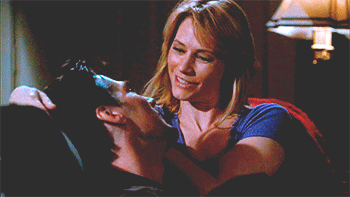
There’s a bunch of controversy I see over Haley Hotchner, but the truth is that they wrote her to be hated. That was her sole purpose. Her character’s decisions were poorly thought out and she was shown to be malicious 80% of the time. This was intentional. She was written to personify the trope of the nagging housewife. If you dislike her, you have done nothing but follow the narrative.
That being said, you should also criticize why they wrote her this way. Because it didn’t make any sense. She married a prosecutor - a dangerous, time consuming job. She had Jack when she knew he was with the BAU. Why did she randomly change her tune? Why did she suddenly demand he gives up on his dreams that she was fully aware of for years? I’d argue they wrote it like this to further the narrative of “the wife who traps you with a child to force you to do what she wants” which is garbage writing. I wish people could look at the potential she had if they hadn’t written her like... that.
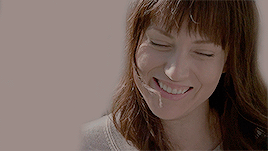
Maeve, I find, is problematic on multiple aspects and I’ve talked about it before. Her narrative was poorly thought out because as soon as they pitched the idea of a long-term love interest for Spencer, everyone (most notably Gubler) rejected it. They didn’t think it was necessary for his character, who already had a lot going on with the ignored plot lines of his drug addiction and mother.
There were multiple problems associated with her character that were never addressed. The fact she essentially just took advantage of a patient because she was bored, she seemed to “correct” his interests and show annoyance when he disagreed with her, she lied about having a fiance, she was shown to be considering breaking up with him... there’s a lot.
Her character is poorly written. It had a lot of potential, but they just kind of stopped caring once they decided to kill her off. She had more faults shown on screen than redeeming qualities. For many, they liked her because they see there was a potential that we’ll never see (fair). But for people like me, we interpret it as a idealized fantasy of what could have (but probably wouldn’t have) been, which is not healthy for Spencer.
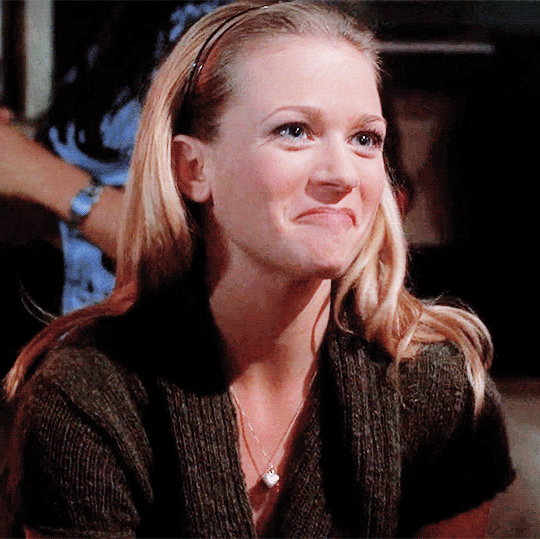
JJ is an interesting character because you can feel the constant struggle between AJ Cook and the writers. They really sabotaged JJ at every step of the way. I’ll be honest and say that I think there are some reasons to hate JJ, but they aren’t the reasons I see most often. Almost all of the JJ hate I see is surrounding the idea that JJ is an evil, manipulative, jealous bitch. But.. she’s not. Even in Truth or Dare, when she pulls that asshole move that was wildly OOC for JJ (in my opinion), she isn’t shown to be jealous or cruel about it.
I think she’s the most likely target for people who’s hatred is driven from jealousy or disliking conventionally attractive women and assuming them to be bitchy by nature of looking “beautiful.” I think Lila Archer* also falls into this category.
But as I said, JJ was also written with a lot of flaws. I think it’s fair if you don’t like her character or the way she treats Spencer, but I also hope that you similarly criticize the whole team in the same way, and don’t just pity Spencer because he is smol uwu babie who needs protection.
(* Yet another reminder that I ask everyone to not message me about J Depp or Amber Heard. Reactive Abuse is an extreme trigger for me and I will block you if you try to get me to talk about it)
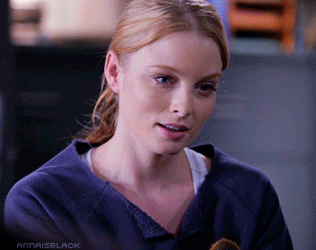
Seaver got a lot of hate based off one line of dialogue. I think it was a bad line. If they had left it out, there would be essentially no reason in my mind to dislike Seaver. I used to dislike her a lot, but the more I rewatch the show, the less she bothers me. She was just a young student who wanted to learn about her father/herself. She was MASSIVELY underdeveloped because they kicked her off just as quickly as they invited her in.
NO character was developed that quickly. Her scenes were a bit cringey and the plotlines were bad, and her character was mediocre. I don’t think she deserves the hate she gets. She is a lukewarm character.
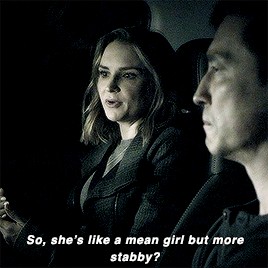
I hate everything Max’s character represents. She was introduced to show that Spencer could be trained to be “normal” and it’s anti-autistic bullshit. She had no personality besides “I hate my low-brow job as a teacher and couldn’t be fucked to change it until a man told me I was smart.” She was cracking high-school-clique jokes while her family was about to be murdered. She immediately abandoned said family to make out with her boyfriend who just admitted to enjoying kissing the woman who tried to murder her family.
Her character makes absolutely zero sense. I do not understand how she is so liked. I really don’t (other than the fact that RLC is absolutely wonderful).
If they had left her character out, I think we would have been better off for it. We could have seen Spencer wrestle with defining himself by the women in his life and learning to love himself (without just replacing those women with... another... woman...)
That being said, those who cling to Max for hope of a happy ending for Spencer... I felt that. Fanon and fanfic can solve all character deficiencies. I believe in you.
So, yeah. I’d say if you’re worried about why you dislike women characters, you’re probably on the right path. I’d just reflect on why you dislike the characters you do and whether they are written as misogynistic stereotypes. It makes complete sense to reject characters written for the purpose of making you hate them, but we should all pour one out for the brilliant actresses that had characters with so much potential if not for men ruining it.
93 notes
·
View notes